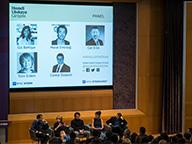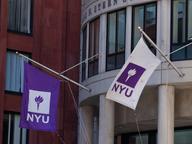Business and Policy Leader Events
—
A Spotlight on Entrepreneurship in Turkey
—

On November 17, NYU faculty, industry practitioners and NYU Stern students convened for the launch event of the Hamdi Ulukaya Initiative (HUG in Turkish), a program aimed at discovering and supporting young entrepreneurs and startups in Turkey.
Business and Policy Leader Events
—

On November 17, NYU faculty, industry practitioners and NYU Stern students convened for the launch event of the Hamdi Ulukaya Initiative (HUG in Turkish), a program aimed at discovering and supporting young entrepreneurs and startups in Turkey.






















